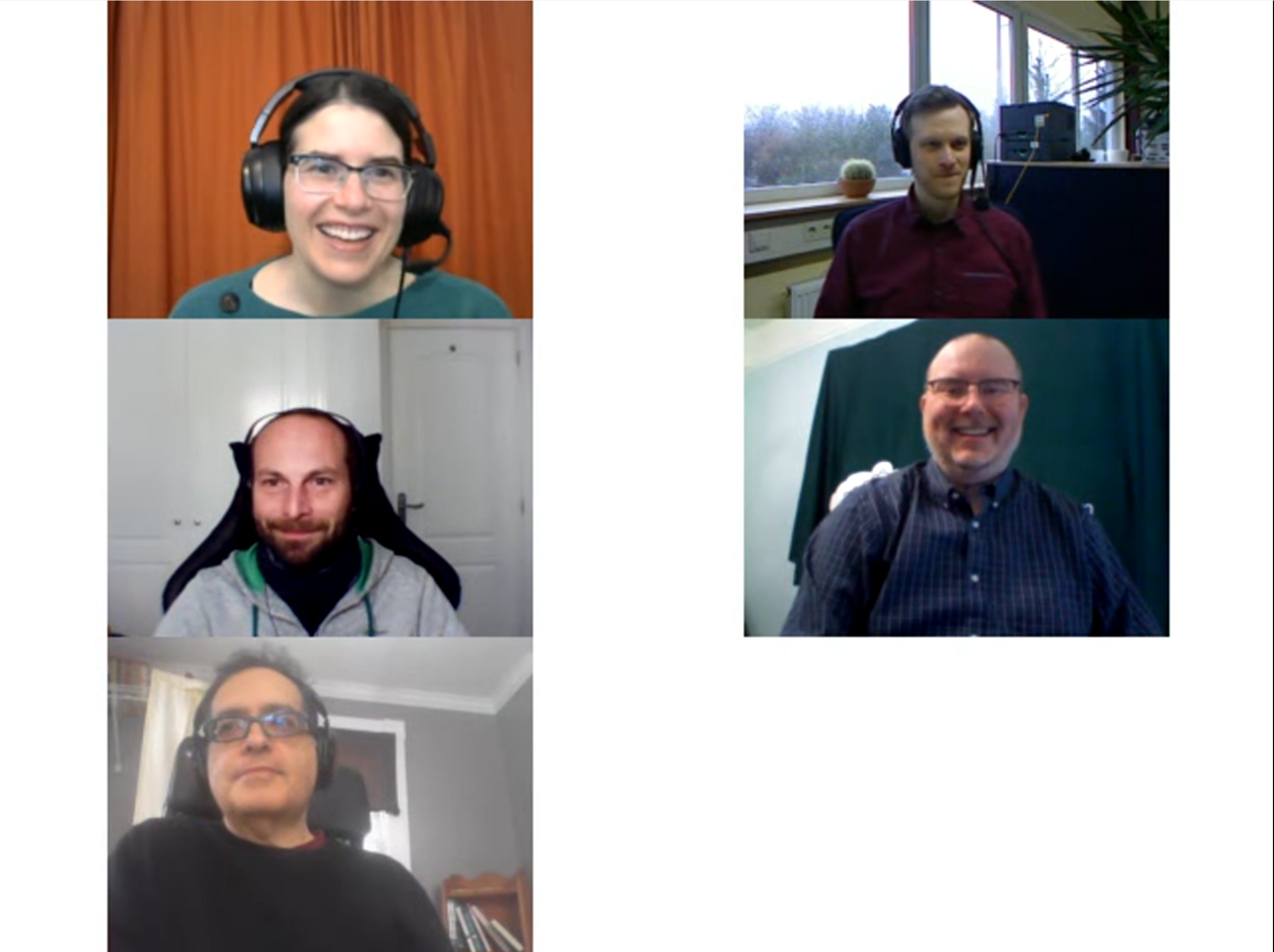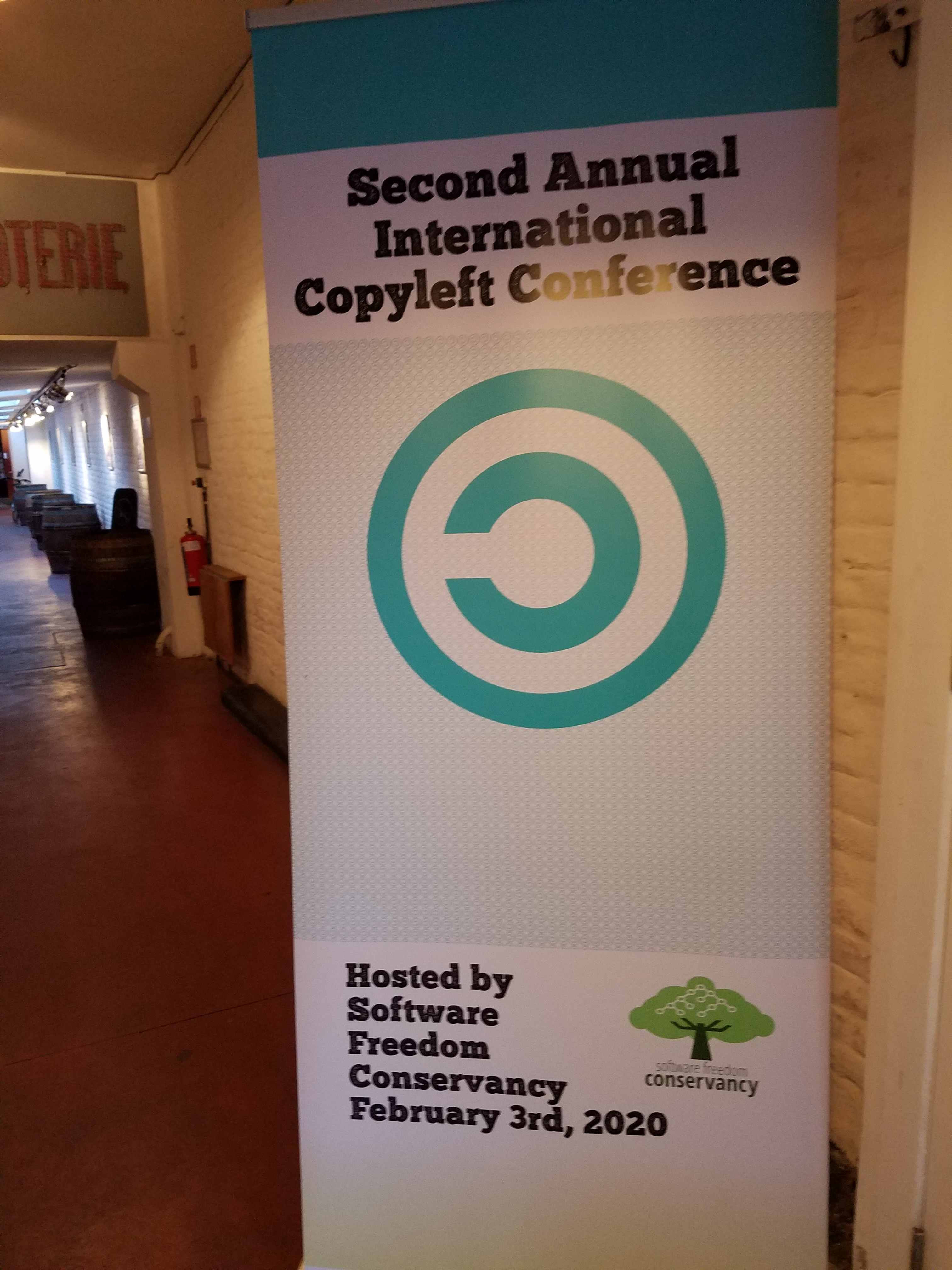![[RSS]](/static/img/feed-icon-14x14.2168a573d0d4.png) Conservancy Blog
Conservancy Blog
Displaying posts
tagged conferences
![]()
RHEL Panel Discussion at FOSSY 2023
by on July 19, 2023
This past weekend, July 13-16th, 2023, Software Freedom Conservancy (SFC) hosted and ran a new conference, FOSSY (Free and Open Source Software Yearly) in Portland, Oregon, USA. I was glad to host the keynote panel discussion on the recent change made by Red Hat (now a subsidiary of IBM) regarding the public source code releases for Red Hat Enterprise Linux (RHEL).
The panelists included (in alphabetical order) Jeremy Alison, software engineer at CIQ (focused on Rocky Linux) and Samba co-founder, myself, Bradley M. Kuhn, policy fellow at SFC, benny Vasquez, the Chair of the AlmaLinux OS Foundation, and James (Jim) Wright, who is Oracle’s Chief Architect for Open Source Policy, Strategy, Compliance, and Alliances.
Red Hat themselves did not reply to our repeated requests to join us on this panel, but we were able to gather the key organizations impacted by Red Hat's recent decision to cease public distribution of RHEL sources. SUSE was also invited but let us know they were unable to send someone on short notice to Portland for the panel.
We're very glad to make the video available to everyone who has been following this evolving story. FOSSY is a new event, and we've hopefully shown how running a community-led FOSS event here in Portland each summer creates an environment where these kinds of important discussions can be held to explore issues impacting FOSS users around the world.
I thank our panelists again for booking last-minute travel to be with us for this exciting panel and thank all the FOSSY attendees for their excellent questions during the panel.
I hope to see all of you at next years' FOSSY!
Call for Community-Led Tracks at FOSSY
by on January 31, 2023
Today Software Freedom Conservancy is officially opening our call for track proposals for our first annual FOSSY conference! We will be holding the conference in Portland, Oregon July 13-16, 2023 at the Oregon Convention Center. We are looking for community driven tracks that can balance important and in depth technical and non-technical issues, while uplifting contributors of all experiences. Tracks will be modeled after the DevRooms at FOSDEM and the miniconfs at linux.conf.au. They may be between 1 and 4 days, and the organizers of the tracks will be in charge of outreach, calls for submissions, communicating with potential speakers in the track, determining the schedule and hosting the track in person at FOSSY.
We're looking for organizers who can give us a really good idea of what we can expect from their track. The description should give a detailed explanation of the topic, ideally along with some of the issues you expect to cover. Example talks you expect, what kind of audience are you aiming for, and how this topic fits into the larger FOSS ecosystem are good things to mention.
You'll note that we ask for two people to be listed as organizers for the track. It's easy to underestimate the work involved so having more than two organizers could also really help to take care of all of the work. We'll be there to help and support you, but this will be your show!
We'd like you to tell us why the organizers are the right ones for the job. Do they have experience running conferences, unique perspectives due to involvement with the topic? Conference organizing is a demanding job that requires a balance of logistics, people centered concerns and technical skills. We trust you to assemble a group of people that can cater to those needs and want to put on a great event.
Given that this is the first FOSSY, we will be creating this space together! How is the topic you are proposing beneficial for the FOSS community and how does it fit into this new space? The hope is to have a balance of technical and non-technical topics, and we want to hear from you about what's important on those issues. Given that we want to shape the conference into something that uplifts contributors of all levels and experience, how will you approach a varied audience?
How long will your track be? Are you planning a quick and deep dive into a single topic or do you dream of having a 4 day long track dealing with tough issues that you want attendees to sit with and reflect on over the weekend? We don't need you to lock yourself into this choice, but we do need a rough figure how much participation and space you'll need if you are hoping to do something specific.
Anything that gives us a sense of the organization and spirit of your tracks will be helpful.
Please use our submission page or email us at conference@sfconservancy.org if you have any questions.
The deadline for application is Sunday March 19th, so be sure to reach out soon!
We're very excited to hear from you about how we can shape this conference into something for us all. Thanks so much for your interest and we hope to see you in July!
The Online Conference Has Been Liberated
by on February 8, 2021
Something unique happened this weekend. Hardly anyone knew about it, in the grand scheme of the entire world population. But, in the FOSS community, it's not uncommon that we see what's coming that can change the world — if only we embrace it and fight for its adoption. We did this with Linux, and below I describe another FOSS solution that needs promotion and that same “accept nothing less” devotion that made Linux succeed.
This weekend, the largest international FOSS conference in the world, FOSDEM, attempted, and succeeded, to achieve what we all thought was not yet possible: They ran a massive online conference event with 100% FOSS0. This conference had more than 25 simultaneous talks at times, with accompanying interactive text-based chat rooms, live Q&A with the speakers on video, and “hallway track” breakout rooms after each talk where speakers and attendees could join video chat together and discuss the talk.

Organizers' Panel from Legal & Policy DevRoom 2021
Photo © by Bradley M. Kuhn, licensed CC BY-SA
In the Legal & Policy DevRoom (the FOSDEM name for what most events would call a “conference track”) that I co-organized this year (with Max Mehl, Richard Fontana, Alexander Sander and Karen Sandler), we had peaked at at least 225 attendees, and most talks had dozens of people interacting and discussing. According to the main FOSDEM organizers, they had a peak of 33,600 attendees and about 22,000 still participating on the second day of the two day event. There were no technical problems in our DevRoom, and I've heard very little about any technical problems in any of the rooms.
Of course, we'd have all rather gone in person to FOSDEM like every other year. But, necessity is the mother of invention, and what the FOSDEM team has done proved that there is absolutely no reason that any online conference should require proprietary software. There is no reason going forward that we should accept excuses; those who claim to be helping Open Source by running proprietary-software-based FOSS-related conferences are now on notice: you are actively thwarting the adoption of proven and working FOSS solutions by any insistence of continuing with proprietary platforms for conferences, developer meetings, and interactive online collaboration.
As always, FOSS is not necessarily free-as-in-price, nor should it be. Bandwidth and computing costs do exist for this. There was much integration effort of the various FOSS technologies such as Matrix, Element.io, and Jitsi to make them work together. But FOSDEM did this work transparently and documented it publicly, and any organization seeking to run a conference can either hire their own people to follow FOSDEM's recipe, or simply hire some of the folks who organized FOSDEM to deploy the technology for you.
We have at least another eight months of remote-only events. Those running events later this year, begin your transition to FOSS now. Our community will not accept a backslide to Zoom or any of the many other proprietary solutions. Proprietary software is what FOSS was made to fight against. Let's start fighting Zoom now.
0 And, regular readers of our blog know me. I checked at every step that what was being loaded was 100% FOSS. The only spot where proprietary software was involved was that the main element.io chat site for FOSDEM — to create your account — loaded proprietary “captcha” Javascript. However, I'm told that this was an option that the FOSDEM organizers had not meant to turn on in element.io, and also if I'd planned far enough ahead to set up my own Matrix server, which I plan to do eventually, I could have just used my existing Matrix account on my own server to authenticate to the element.io software (which is based on Matrix).
Last Week in Brussels: FOSDEM, Copyleft Conf and More
by on February 10, 2020
FOSDEM
FOSDEM is a great volunteer-run, community-driven event that has been going on for twenty years!! Conservancy staff and volunteers who attend the event are grateful to have the opportunity to interact with so many passionate free software advocates in one place each year.
The FOSDEM organizers invited Bradley and Karen to speak on the main track talk — the next installment talk on the difficulty in living in software freedom and making ethical choices today — a follow-up to their keynote from last year.
Conservancy staff also gave some DevRoom talks, including participating in the one-of-a-kind debates in the Legal & Policy DevRoom this year. Nearly all of these recordings are now available. The FOSDEM video team is amazingly efficient — with a fully FOSS system for conference video!
The well-attended Legal & Policy DevRoom (which Bradley and Karen help organize each year) occurred all day on Saturday. In the morning, Bradley participated in a debate entitled, Does Careful Inventory of Licensing Bill of Materials Have Real Impact on FOSS License Compliance? The debate format was an exciting new addition to the DevRoom this year. (Please note that per the debate format, some speakers took positions that did not necessarily reflect their personal or organizational views.)
On Sunday, Deb spoke about Building Ethical Software Under Capitalism, in the Community Devroom. Later that day in the same room, Bradley Kuhn discussed, How Does Innersource Impact on the Future of Upstream Contributions?.
On Sunday, Conservancy welcomed attendees to learn more about our organization at our booth. We thank our volunteers who greeted and discussed Conservancy's work with attendees; we appreciate your energy. Also, thanks to the many Outreachy alums (all of whom are still participating in FOSS!) who stopped by the booth — it's really gratifying to hear from you. One current intern even asked for a selfie with our staff!
Many of our member projects were also at FOSDEM. Coreboot ran a shared booth, Homebrew had their second in-person meeting on Monday and Godot had a booth and helped run the Gaming Development track.
Godot also hosted two pre-conference sprint days and a two day “FOSDEM Fringe” event — GodotCon.Copyleft Conf

Photo is by Deb Nicholson and is available under a CC-BY-SA-4.0 license
We ran the Second Annual Copyleft Conf on Monday. The event sparked lively and respectful conversations about the use and future of copyleft. The event included an exciting, multi-faceted schedule of talks and panels. Our lovely program committee — Molly de Blanc, Nithya Ruff, Harald Welte, Josh Simmons, Beth Flanagan, Bradley Kuhn and Deb Nicholson — curated and selected excellent content for the day. Thanks also to our Copyleft Conf volunteers, who helped with registration, speaker introductions and time-keeping.
All the Copyleft Conf sessions and Deb's CHAOSS Con keynote (a Friday “FOSDEM Fringe” event), Ethics: What You Know & What You Don't Know should be posted within a few weeks.
